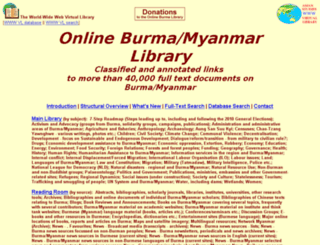Focal point
Location
The Online Burma/Myanmar Library (OBL) is a non-profit online research library mainly in English and Burmese serving academics, activists, diplomats, NGOs, CSOs, CBOs and other Burmese and international actors. It is also, of course, open to the general public. Though we provide lists of Burma/Myanmar news sources, the Library’s main content is not news but in-depth articles, reports, laws, videos and links to other websites, We provide a search engine (database and full text) and an alphabetical list of categories and sub-categories, but the Library is best accessed through browsing the 100 or so categories which lead to sub- and sub-sub categories. These tools should be used in combination.
Members:
Resources
Displaying 201 - 205 of 1151On The Land We Live - A film about land reform in Myanmar (video)
Documentary by the Land Core Group Myanmar, where 70% of the Myanmar population are smallholder farmers, about the challenges faced by poor farmers from land grabbing and land dispossession in rural Myanmar...Interviews with land activists and dispossessed farmers in different parts of the country... sections on: resistance to land-grabbing; Myanmar land law and policies (where customary tenure and women's land rights are not explicitly recognised); efficiency of smallholder practice...
Offshore gas fields to halt in April
Three of the country’s four offshore gas fields are to be shut down in April “for annual maintenance”, according to a senior official with Myanma Oil and Gas Enterprise...The Yadana, Yetagun and Zawtika gas fields are to be halted for about a week each at the end of April, said the official, who is an offshore director but declined to be named.
“We have negotiated with PTT [the gas buyer] for gas exports, and with the Ministry of Electric Power for domestic supply, to arrange a shutdown of the gas fields for maintenance,” he said yesterday.
How China Fuels Myanmar’s Wars
...When an estimated 50,000 ethnic Kokang civilians poured into southwest China last month to escape fighting between the Myanmar Army and Kokang rebels, Beijing called for peace and provided food, medical supplies and camps for the refugees. But China’s stance as a benevolent mediator in Myanmar’s many internal conflicts and its treatment of asylum seekers is far less altruistic than Beijing cares to admit.
Joint submission to the UN Universal Periodic Review
EXECUTIVE SUMMARY: •This joint submission by the Coalition of Indigenous Peoples in Myanmar/Burma focuses on
the collective rights of indigenous peoples, particularly the thematic areas of land,
territories, and natural resources, development, and language and cultural rights, with
militarization, self-determination, and free, prior
and informed consent (FPIC) as cross-cutting issues. •Section A describes the context of indigenous peoples in Myanmar/Burma. It highlights the
Commercial Agriculture Expansion in Myanmar: Links to Deforestation, Conversion Timber, and Land Conflicts
In Myanmar, as in other countries of the Mekong, it is widely acknowledged that the clearing of forests to
make way for the expansion of commercial agricultural fields is increasingly the leading driver of deforestation,
alongside legal and illegal logging, and the clearance of forest areas to make way for infrastructure projects
such as roads and hydropower dams. While the conversion of forests for agricultural development has been
occurring for many decades, it is the unprecedented rate of this conversion that is now so astounding — as


